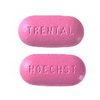Pentoxifylline
May Improve Endothelial Dysfunction in People with HIV
 |
 |
 |
 |
 |
 |
 |
| SUMMARY:
The
anti-inflammatory dug pentoxifylline improved blood
flow and reduced levels of 2 blood biomarkers associated
with inflammation and endothelial dysfunction in untreated
people with HIV in a small pilot study described in
a research letter in the June
1, 2010 issue of AIDS. These findings suggest
that reducing inflammation may help lower the risk of
atherosclerosis, which can lead to heart attacks. |
|
 |
 |
 |
 |
 |
 |
 |
By
Liz Highleyman
 |
|
|
Observational
studies have found that people with HIV have a higher risk of
cardiovascular disease compared with the general population. The
reason for this is not fully understood, but inflammation and
metabolic changes related to antiretroviral drugs appear to play
a role.
Inflammation is a key feature of atherosclerosis, or "hardening
of the arteries," a progressive condition in which arteries
lose their elasticity and become filled with plaques made up of
lipids, immune cells, and other material. Eventually this blockage
can impair blood flow and pieces of plaque or blood clots can
break away and become lodged in vessels supplying the heart (causing
a heart attack) or the brain (causing a stroke). Many signaling
molecules are involved in this process, some of which can be measured
in the blood as biomarkers of inflammation, coagulation (clotting),
and endothelial (blood vessel lining) dysfunction.
 Samir
Gupta from Indiana University School of Medicine and colleagues
conducted a small pilot study to assess whether the anti-inflammatory
drug pentoxifylline (Trental) could reduce systemic inflammation
and improve endothelial function in HIV positive people who did
not require antiretroviral therapy (ART).
Samir
Gupta from Indiana University School of Medicine and colleagues
conducted a small pilot study to assess whether the anti-inflammatory
drug pentoxifylline (Trental) could reduce systemic inflammation
and improve endothelial function in HIV positive people who did
not require antiretroviral therapy (ART).
The
SMART study showed that CD4-guided ART interruption was associated
with elevated
levels of certain inflammation biomarkers and increased risk
of heart disease, the study authors noted as background, but this
link has not been extensively studied in individuals who have
a CD4 cell count high enough that they have not yet started treatment.
The
researchers previously found that another anti-inflammatory drug,
salsalate, improved endothelial function in untreated HIV positive
patients, but caused liver toxicity. Here, they tested pentoxifylline,
a drug approved for treatment of impaired peripheral blood flow,
that works by blocking tumor necrosis factor-alpha (TNF-alpha)
production.
This
open-label study included 9 participants (6 men, 3 women) who
had CD4 counts above 350 cells/mm3 (median 552 cells/mm3) and
were either treatment-naive or had not taken ART for at least
6 months. People with pre-existing cardiovascular disease, diabetes,
high blood pressure, use of cholesterol-lowering dugs, or signs
of impaired liver or kidney function were excluded. Four were
smokers and 2 were coinfected with hepatitis C.
All
participants received 400 mg oral pentoxifylline 3 times daily
for 8 weeks. Endothelial function was determined by flow-mediated
dilation of the brachial artery in the upper arm (a measure of
how well blood vessels expand in response to changes in blood
flow) and nitroglycerin-mediated dilation.
The
researchers also measured levels of several biomarkers of inflammation
and endothelial function including soluble vascular cell adhesion
molecule-1 (VCAM-1), soluble intercellular adhesion molecule-1
(ICAM-1), and E-selectin -- molecules that enable leukocytes,
or immune system white blood cells, to adhere to and move along
blood vessel walls -- high sensitivity C-reactive protein (CRP),
monocyte chemoattractant protein-1 (MCP-1), macrophage inflammatory
protein 1-beta (MIP-1-beta), TNF-alpha, soluble TNF receptor 1
and 2, and interferon-gamma induced protein (IP-10).
Results
 |
At
baseline, flow-mediated dilation was impaired (at 2.1%) compared
with healthy HIV negative control subjects. |
 |
7
participants completed the study (the other 2 discontinued
because they started ART or steroid treatment for bronchitis). |
 |
Over
8 weeks of treatment, pentoxifylline significantly improved
endothelial function: |
| |
 |
Week
4: 1.5% increase; |
 |
Week
8: 4.4% increase. |
|
 |
Nitroglycerin-mediated
dilation did not change significantly. |
 |
Pentoxifylline
significantly reduced circulating levels of soluble VCAM-1
and IP-10, but there were no significant changes in other
biomarkers. |
 |
6
patients experienced mild diarrhea that was not treatment-limiting.
|
 |
No
notable clinical or laboratory or toxicities, including liver
abnormalities, were observed. |
"Eight
weeks of treatment with pentoxifylline safely and significantly
improved endothelial function in HIV-infected patients not receiving
combination ART," the investigators concluded. "Pentoxifylline
may reverse HIV-related endothelial dysfunction by directly inhibiting
the endothelial leukocyte adhesion pathway."
Two randomized, placebo-controlled trials are now underway and
recruiting participants to investigate the effects of pentoxifylline
on endothelial function in HIV patients not requiring ART (ClinicalTrials.gov
identifier NCT00796822)
and those starting ART (NCT00864916).
Investigator affiliations: Department of Cellular and Integrative
Physiology, Indiana Center for Vascular Biology and Medicine,
Indiana University School of Medicine, Indianapolis, IN; Section
of Cardiology, University of Chicago Medical Center, Chicago,
IL; Division of Clinical Pharmacology, Department of Medicine,
Indiana University School of Medicine, Indianapolis, IN; Division
of Infectious Diseases, Department of Medicine, University of
Southern California Keck School of Medicine, Los Angeles, CA.
7/9/10
Reference
SK Gupta, RM Johnson, KL Mather, and others. Anti-inflammatory
treatment with pentoxifylline improves HIV-related endothelial
dysfunction: a pilot study. AIDS 4(9): 1377-1380 (Abstract).
June 1, 2010.
